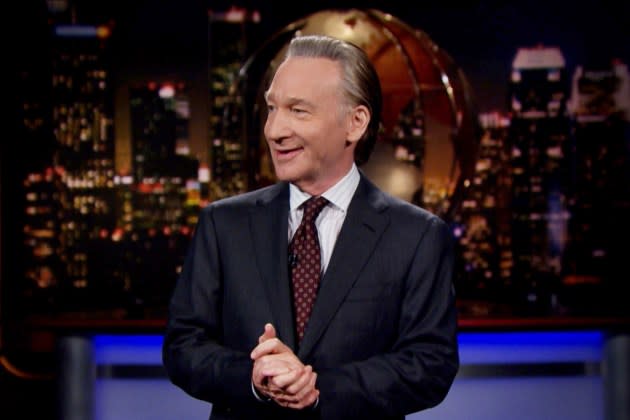Bill Maher’s ‘Real Time’ Talks About…What Else? That Will Smith Slap To Chris Rock

You knew going into Friday’s Real Time on HBO that Bill Maher would cover the topic that everyone in Hollywood is talking about. And did he ever, starting from the top.
“Thank you all for coming and putting on a brave face,” Maher said right at the start, adding that he knew everyone was still processing the week’s biggest moment. “To Will Smith: stay strong and I got your back.”
More from Deadline
Grammy Winners List: Olivia Rodrigo Wins Best New Artist - Updating Live
'Peaky Blinders' Series Finale Recap: Twists, Turns & A Prophecy Come True
Maher paused a beat. “April Fools. You’re a dick.”
That set the tone for a run of Will Smith jokes. “I’m not here to humiliate Will Smith. He gets enough of that at home.”.
Maher allowed that “Every single person in America was talking about the sucker punch heard ’round the world,” and noted, “That whole ‘Keep my wife’s name out of your mouth’ didn’t really work out.”
The physical confrontation between Smith and Rock was short. “There was more action in three seconds than in three hours of The Power of the Dog,” Maher said, adding, “Who would have thought the movie coming out of the Oscars with all the buzz was GI Jane.
Maher turned serious for a moment, noting that comparing a woman to Demi Moore at her hottest was not a huge insult. “Alopecia is not leukemia,” he said. “I blame toxic femininity.”
There was controversy on top of controversy, Maher said. Smith got into a shoving match with Liza Minnelli, he claimed.
Of course, there were other things going on in the world this week. “But we don’t care about that,” Maher said.
The panel portion of the show featured Laura Coates, CNN Senior Legal Analyst and author of Just Pursuit: A Black Prosecutor’s Fight for Fairness and host of SiriusXM’s “The Laura Coates Show”; and Andrew Yang, founder of the new political third party Forward and author of Forward: Notes on the Future of our Democracy.
The Smith/Rock battle was put to the panelists, with focus on how liberal hypocrisy seemed to be the Oscars big loser.
Coates couldn’t believe Smith received a standing ovation for winning the Best Actor award minutes after his slap. “I thought, ‘Why is he even there to get the award?” The former prosecutor was also surprised Smith was allowed to hang around, saying a civilian pulling that would have been dragged off if he said, “Oh, no. I got the rest of my kid’s soccer game.”
Yang made a point on why Smith was allowed to stay. “Part of it was he’s Will Smith. Anyone else would have been ushered out.”
Maher again focused on the celebrities who applauded Smith. “They’e always talking about micro-aggressions,” Maher said. But “suddenly, they were OK with this.” It was a moment that “showed broken morals,” he contended.
Maher raised the point that the Oscars “represent pandering. They’re not connected to everyday people.” This year was all about “disability, gay, race,” he said, noting that it looks like that’s all the Oscars were about.
Yang noted that the Democrat brand now represents “insincere moralizing” to much of America, and told how people would recoil when they learned on the campaign taril that he was a Democrat.
The message of the Smith standing ovation was that the celebrity audience broadened the definition of violence. “Actual violence? Not a big deal. Except when I feel like it, then it’s a great answer” Maher said.
Coates termed that “Convenient compartmentalization.”
Maher agreed. While Timothée Chalamet can wear a tuxedo without a shirt to the Oscars, “I wouldn’t want to see Jonah Hil do that,” said Maher.
There was one point left to make. Maher related how he talked to an African American friend at the Vanity Fair party, and someone in the crowd raised the question about what would have happened if Rock responded to the slap by fighting back. “He couldn’t,” Maher’s friend said. “He had the whole race on his shoulders.”
Earlier in the show, Maher had a one-on-one interview with Nicole Perlroth, former lead cybersecurity and digital espionage reporter for the New York Times and author of This Is How They Tell Me the World Ends: The Cyberweapons Arms Race. As the book’s title suggests, Perlroth painted a gloomy picture of the US lack of preparation for a cyber war,
Best of Deadline
Spring Premiere Dates For New & Returning Series On Broadcast, Cable & Streaming
TV Finales: CBS Sets 'Bull' End Date & Season Wraps For 19 Other Series
Sign up for Deadline's Newsletter. For the latest news, follow us on Facebook, Twitter, and Instagram.

